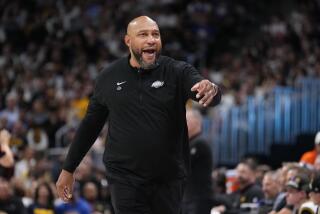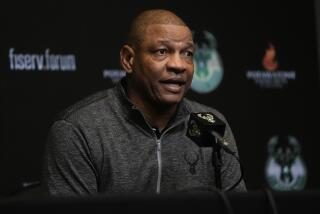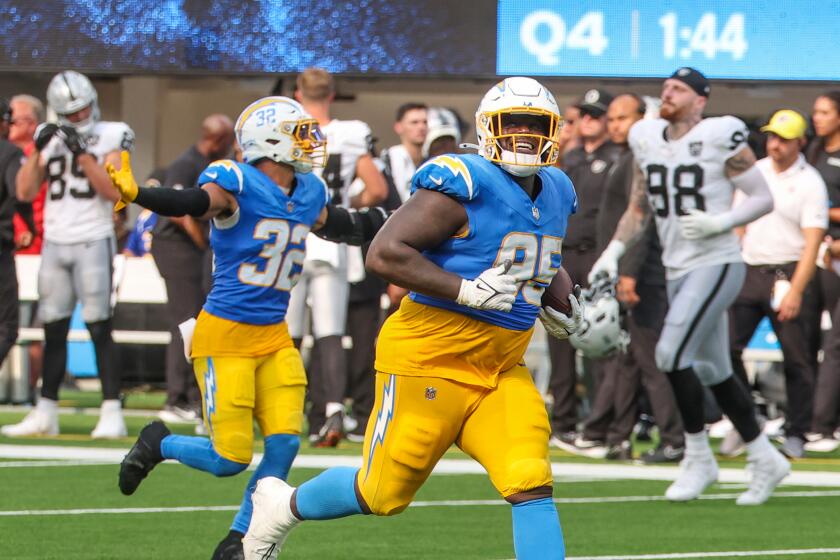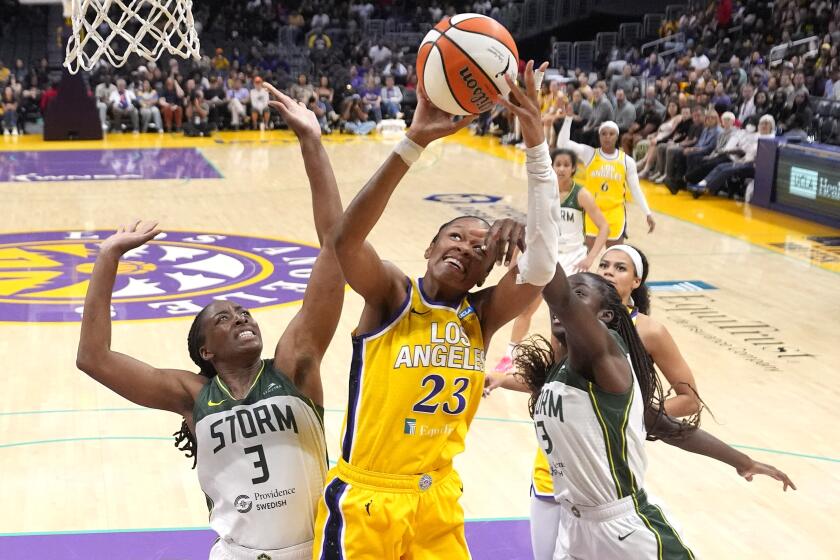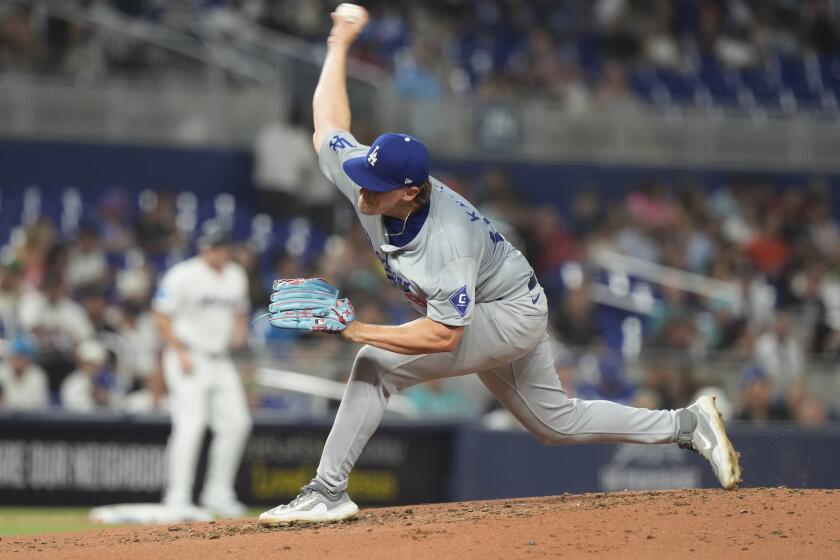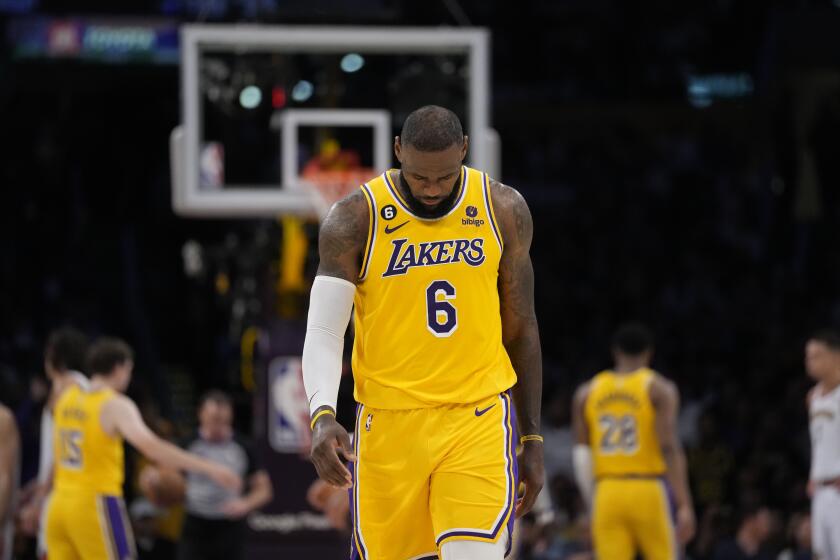Clippers’ Doc Rivers a straight shooter as player, and as coach
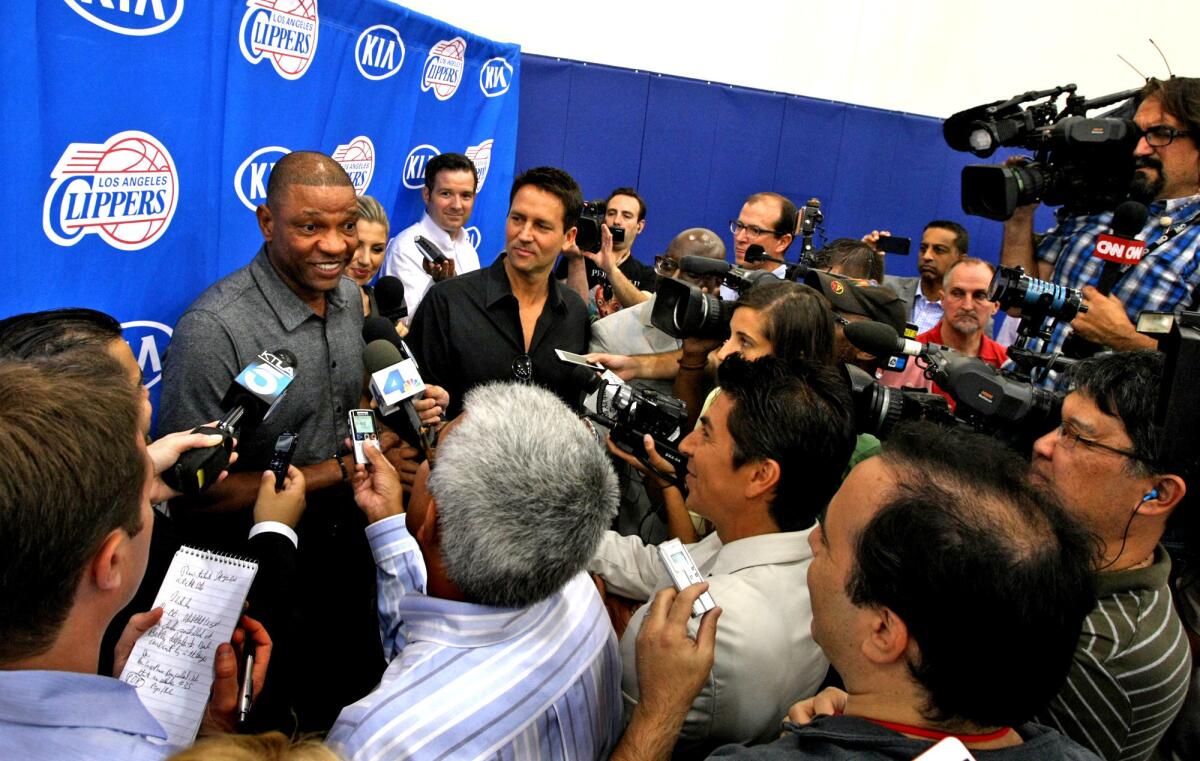
Doc Rivers was a McDonald’s All-American, one of the top recruits in the nation, a budding star bound for Marquette.
None of that made any difference to the phrase on the wall of his high school gym that confronted him each day as he jumped rope before practice.
If you think you’re so important to this team, stick your foot in a bucket of water. When you take your foot out, the hole you leave will be how much you’ll be missed when you walk out of the door.
It was just another harsh message in a childhood dripping with them.
Rivers’ father, Grady, was a police lieutenant in the Chicago suburb of Maywood who threatened to leave his son in jail if the fights he invariably found himself in ever landed him behind bars. His grade school teacher twice wiped out the career ambition he scrawled on the classroom blackboard — “Pro basketball player” — before dispatching him to the principal’s office after he wrote it a third time.
You experience enough of this and you quickly become an expert in the art of being blunt.
Of course, Rivers also benefited from plenty of nurturing. The same high school coach whose message told Rivers he was no better than anyone else always made sure he was more than prepared than his opponent, down to the nuances of each play. The same father who promised to leave him in jail bailed him out with the grade school teacher, admonishing her for daring to tell his son what he could not do.
Maybe this convergence of early influences explains in part the duality of Rivers, the new Clippers coach whose gravitational personality sharply contrasts with his ability to tell his players what they don’t want to hear but often need to know for their own benefit.
“I think as a player I appreciated it — even if it hurt — when I felt like the coach just told me the truth and stopped sugarcoating it,” Rivers said last week during a quiet moment inside the Clippers’ training facility in Playa Vista. “And that doesn’t mean there’s not different ways of saying it at different times, but it always has to be the truth and your heart always has to be in what you say.”
The words of his late father still resonate in NBA locker rooms before games. Sayings such as “Trust everybody but cut the cards” and “Finish the race” were staples during Rivers’ nine seasons with the Boston Celtics. It was a largely successful run that included a championship in 2008 and another trip to the Finals in 2010 before the Celtics last week allowed the Clippers to assume the final three years of Rivers’ contract in exchange for a first-round draft pick.
“Finish the race” could be a particularly useful catchphrase for the Clippers, a franchise that for most of its existence has been a 10-minute-miler trying to win a world-class marathon. The arrival of Blake Griffin and Chris Paul in recent years has nudged the team toward the front of the pack but not past the second round of the playoffs.
“My dad always told me, ‘Keep running, keep moving,’” said Rivers, who turns 52 in October, “and you can make a case that’s what I’m doing now.”
What’s up, Doc?
Rivers’ new job came with a second title: senior vice president of basketball operations.
Those were the six words that made him willing to forgo the rebuilding efforts the Celtics accelerated Thursday with the proposed trade of veteran stars Kevin Garnett and Paul Pierce to the Brooklyn Nets. Rivers said he coveted the challenge of assembling a roster in tandem with Gary Sacks, the Clippers’ vice president of basketball operations.
General managers who get Rivers on the phone don’t need to fret about what to call him. He still prefers Doc, the nickname the late Rick Majerus gave the eighth-grade boy when he wore a Julius Erving (a.k.a. Dr. J) T-shirt to a basketball camp.
Rivers, whose given first name was Glenn, initially resisted the nickname before relenting once he signed with Marquette to play for Majerus and Hank Raymonds. He had learned by then that it was always best to defer to his coaches.
“When you were on that court, they were in charge and that was the bottom line,” said Grady Rivers Jr., Doc’s older brother. “He got that young and it’s carried over.”
As a coach, Rivers has been the boss since Day One, dispensing barbs that could pierce even the most rugged exteriors.
He openly chided the Celtics’ Rajon Rondo early in his career, telling the point guard that his teammates hated playing with him because of his bouts of sullenness and exasperation over their mistakes.
“That’s pretty unheard of in this league, to speak to your stars as you speak to the 15th man,” said journeyman center Ryan Hollins, who spent part of the 2011-12 season playing for Rivers in Boston and played for the Clippers last season. “If they’re out of line, he would speak on that and have it known.”
Using the criticism as motivation, Rondo became a more team-oriented presence for the Celtics.
Perhaps that’s the true genius of Rivers. Known as a defensive innovator, his best work may have come in getting his players to let their guard down in the locker room and on the practice court.
“The people part of basketball is far more important than the Xs and O’s,” Rivers said. “I can draw up a great play and if five guys don’t want to follow me, the play’s not going to work. And I can draw up a bad play and if all five guys do exactly what I need them to do, we have a great chance of it working.”
A coach on the court
Rivers was a galvanizing presence throughout an NBA playing career that spanned more than a decade, becoming the Atlanta Hawks’ captain in only his fourth professional season.
He quickly impressed Clippers President Andy Roeser, who then ran the team’s business operations, when the Clippers acquired Rivers in the summer of 1991. The point guard helped lead the Clippers to the playoffs the next season for the first time since the franchise moved to Los Angeles in 1984.
Roeser realized he not only had a quality player in his midst but also someone who possessed the smarts and the presence to run a team.
“The way he understood the game, the impact he had on our players on the court, in our locker room and just the way he went about things,” Roeser recalled, “early on I had an instinct he would be coaching in this league.”
It didn’t hurt that the list of coaches Rivers played for read like a who’s who of the game’s top minds: Mike Fratello, Larry Brown, Pat Riley and Gregg Popovich, who was an assistant under Bob Hill when Rivers was with the Spurs in the last two seasons of his playing career, which ended in 1996.
Rivers would quickly make a case that he was headed for membership in that fraternity after the Orlando Magic hired him in 1999 without any coaching experience.
Successes and failures
The Magic was a ragtag collection of players in Rivers’ first season.
The team had traded star Penny Hardaway amid a flurry of personnel moves that left it with 12 players who had no more than two years of NBA experience.
“We had a better team than we probably knew we had,” said John Gabriel, the former Orlando general manager who hired Rivers, “but this league is about great players and stars and I don’t think we had anyone who remotely came close to making an All-Star ballot.”
Rivers brought the team along quickly, the Magic finishing one game out of a playoff spot in 2000, and was selected the league’s coach of the year.
There were even higher hopes the next season after Orlando acquired Grant Hill and Tracy McGrady, but injuries would limit Hill to 47 games over the next four seasons.
The Magic made three consecutive appearances in the Eastern Conference playoffs, never advancing past the first round. Most vexing was a loss to the Detroit Pistons in 2003 after Orlando held a 3-1 lead in the best-of-seven series.
Rivers was dismissed the next season after his team lost 10 of its first 11 games.
He wasn’t unemployed as a coach long, hired by Boston before the start of the next season. His early tenure with the Celtics mirrored his time with the Magic — a strong first season followed by two years of mediocrity.
Boston endured a franchise-record 18-game losing streak at one point and Rivers was only 102-144 with the Celtics before Garnett and Ray Allen arrived prior to the 2007-08 season.
Blending a mix of ring-seeking veterans Allen, Garnett and Pierce with eager youngsters such as Rondo, Tony Allen and Kendrick Perkins, Rivers guided the Celtics to the NBA title, the team stomping the Lakers by 39 points in a series-clinching Game 6 of the Finals.
They would return to the Finals two years later, falling to the Lakers in seven games. The Celtics never again reached basketball’s biggest stage under Rivers, prompting him to dismiss the “best coach in the NBA” label that was affixed to him by Clippers executives at his introductory news conference.
“I’m not that smart yet; I hope to be someday,” Rivers said. “But I just watched the Finals and I wasn’t in it either along with the players on the Clippers, so we all have a lot of work to do.”
A new era
When he coached the Celtics, Rivers regularly commuted from Boston to his sprawling home in Winter Park, Fla., to attend his four children’s sporting events.
He was there to see his son Jeremiah play in a state high school championship basketball game and his daughter Callie win three volleyball state titles. He also watched his son Austin win a pair of state championships and was inside the Dean Smith Center when the point guard who now plays for the New Orleans Pelicans made a buzzer-beating three-pointer to lift Duke over archrival North Carolina.
“I spent a lot of money but don’t care,” Rivers said of his private air travel. “Honestly, it’s well worth it.”
He will go back to Florida whenever he can next season to watch his youngest son, Spencer, play basketball. He’s unsure if the family will move to Southern California after Spencer’s high school graduation.
For now, Rivers’ attention will shift to another collection of youngsters.
The coach said he envisioned the Clippers’ Griffin and DeAndre Jordan possibly forming the best big-man tandem defensively in the NBA. Paul will give the team a steadying presence as the leader on the court, assuming he is re-signed to a maximum five-year contract extension next month.
That’s not to say Rivers won’t bound into the mix whenever he thinks its necessary.
“Listen, I don’t want to make anyone unhappy,” Rivers said. “I want everybody to be happy, but I know that’s not going to be the case.”
twitter.com/latbbolch
More to Read
Go beyond the scoreboard
Get the latest on L.A.'s teams in the daily Sports Report newsletter.
You may occasionally receive promotional content from the Los Angeles Times.

